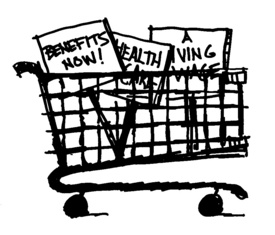
First time applications for unemployment benefits skyrocketed to a seven year high in September as more workers lost their jobs in an economy that John McCain described, only two weeks ago, as “basically sound.”
Initial jobless claims rose to 497,000 in the week that ended Sept. 27, the Labor Department said Oct. 2, making the monthly total for September a seven year high.
“The financial turmoil and panic of the past several weeks has clearly done substantial economic damage, Ryan Sweet, an economist at Moody’s Economy.com in West Chester, Penn., said in a Bloomberg Radio interview.
Initial jobless claims reflect weekly firings and rise as job growth slows or grinds to a halt.
So far this year, weekly claims have averaged 388,000 compared with an average 321,000 for all of 2007.
Mounting unemployment triggered by the biggest housing recession in a generation undermined consumer spending even before the current financial meltdown started to make things worse. The government is expected to report Oct. 3 that there were record job losses in September for the ninth month in a row.
The economy has lost 605,000 jobs in the first eight months of 2008. The Oct. 3 payroll report from the Labor Department is expected to show that at least 105,000 additional jobs were permanently lost during the month of September. A gain of about 130,000 jobs is needed just to keep pace with new people entering the workforce.
The current credit crisis is expected to result in even more layoffs in October than there were in September, economists warn. Barclay’s, the British company that bought Lehman Brothers after it failed is expected to lay off workers in October. Thousands more will be laid off at the other two giants taken over by the government: American Insurance Group Inc. and Washington Mutual Inc.
Auto companies and other manufacturers are expected to follow suit with more layoffs of their own.
In some ways, the economy is reeling from what amounts to a “perfect storm.” The worst market meltdown since the Great Depression comes during a period of mounting job losses, a housing slump now in its third year, and drastic cuts in spending by consumers. An end to economic growth overseas, meanwhile, is cutting demand for U.S. goods and further hurting manufacturing here. Europe’s economy shrank in the second quarter of this year for the first time in more than ten years. Japan’s economy also went into recession in the same quarter
The Senate, Oct. 2, approved a bailout package intended to get credit markets moving again. With the exception of few modifications, such as an increase in federal deposit insurance, the bill was similar to the bailout package voted down in the House earlier in the week.
Barack Obama, during the debate on the bailout, said, “We need to move aggressively with the same sense of urgency to rescue families on Main Street who are struggling to pay their bills and keep their jobs. They’ve been in crisis a lot longer than Wall Street has.”
Last week Senate Republicans had blocked an economic recovery package that included a seven week extension of unemployment benefits, $32.4 billion for job-creating infrastructure projects and $14 billion to help states pay their share of Medicaid costs.
Commenting on the economic situation and its connection to the election, John Sweeney, president of the AFL-CIO, declared Oct. 2: “Decades of financial deregulation and attacks on unions and the middle class – together with a failure to address the housing bubble – led us straight into this current crisis.
“The choice is clear. John McCain has been a lifelong deregulator and privatizer, while Barack Obama has consistently fought for working people. We can’t afford to hand the keys to the car over to the guy who drove us off the road in the first place.”
jwojcik @ pww.org











Comments